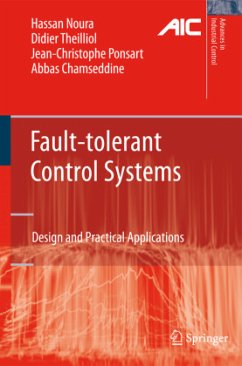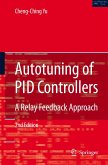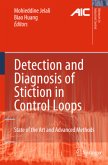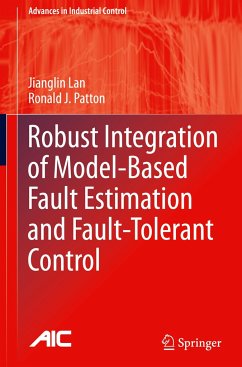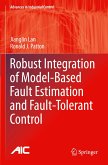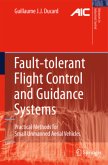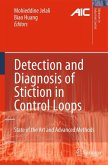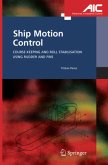This book reports the development of fault diagnosis and fault-tolerant control (FTC) methods with their application to real plants. After an introduction to fault diagnosis and FTC, a chapter on actuators and sensors in systems with varying degrees of nonlinearity leads to three chapters in which the design of FTC systems is given thorough coverage for real applications: a winding machine typifying a subsystem in various sheet and film processes; a hydraulic 3-tank system representative of those used widely in chemical plants; and an active suspension system demonstrating application in whole large-scale systems by splitting into subsystems.
Actuator and sensor faults are accommodated within the control-law design and the integration of fault diagnosis models in the FTC systems described. Linearized systems around an operating point and nonlinear systems are discussed and illustrated. A complete simulation platform of the 3-tank system is provided via download from www.springer.com / ISBN 978-1-84882-652-6.
The seriesAdvancesinIndustrialControl aims to report and encourage te- nologytransfer in controlengineering. The rapid development of controlte- nology has an impact on all areas of the control discipline. New theory, new controllers, actuators, sensors, new industrial processes, computer methods, new applications, new philosophies. . . , new challenges. Much of this devel- ment work resides in industrial reports, feasibility study papers, and the - ports of advanced collaborative projects. The series o?ers an opportunity for researchers to present an extended exposition of such new work in all aspects of industrial control for wider and rapid dissemination. Control system design and technology continues to develop in many d- ferent directions. One theme that the Advances in Industrial Control series is following is the application of nonlinear control design methods, and the series has some interesting new commissions in progress. However, another theme of interest is how to endow the industrial controller with the ability to overcome faults and process degradation. Fault detection and isolation is a broad ?eld with a research literature spanning several decades. This topic deals with three questions: - How is the presence of a fault detected? - What is the cause of the fault? - Where is it located? However, there has been less focus on the question of how to use the control system to accommodate and overcome the performance deterioration caused by the identi?ed sensor or actuator fault.
Actuator and sensor faults are accommodated within the control-law design and the integration of fault diagnosis models in the FTC systems described. Linearized systems around an operating point and nonlinear systems are discussed and illustrated. A complete simulation platform of the 3-tank system is provided via download from www.springer.com / ISBN 978-1-84882-652-6.
The seriesAdvancesinIndustrialControl aims to report and encourage te- nologytransfer in controlengineering. The rapid development of controlte- nology has an impact on all areas of the control discipline. New theory, new controllers, actuators, sensors, new industrial processes, computer methods, new applications, new philosophies. . . , new challenges. Much of this devel- ment work resides in industrial reports, feasibility study papers, and the - ports of advanced collaborative projects. The series o?ers an opportunity for researchers to present an extended exposition of such new work in all aspects of industrial control for wider and rapid dissemination. Control system design and technology continues to develop in many d- ferent directions. One theme that the Advances in Industrial Control series is following is the application of nonlinear control design methods, and the series has some interesting new commissions in progress. However, another theme of interest is how to endow the industrial controller with the ability to overcome faults and process degradation. Fault detection and isolation is a broad ?eld with a research literature spanning several decades. This topic deals with three questions: - How is the presence of a fault detected? - What is the cause of the fault? - Where is it located? However, there has been less focus on the question of how to use the control system to accommodate and overcome the performance deterioration caused by the identi?ed sensor or actuator fault.
From the reviews: "An introduction to model-based fault detection and isolation (FDI) and fault tolerant control (FTC). ... The book can easily be read and understood and should be particularly useful for graduate students and practicing control engineers." (Adrian-Mihail Stoica, Mathematical Reviews, Issue 2011 i)

